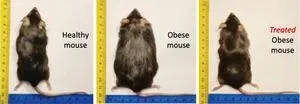(Press-News.org) WACO, Texas (Aug. 29, 2023) – Hot flashes are one of the most concerning and most reported symptoms among menopausal women and breast cancer survivors. Currently, paroxetine is a FDA-approved non-hormonal drug used for the treatment of hot flashes. In an article published this month in the journal Frontiers in Psychiatry, researchers at Baylor University tested the efficacy of paroxetine by conducting a systematic review and meta-analysis of six clinical trials, finding that the benefits of paroxetine in the treatment of hot flashes to be comparable to that of the placebo response.
The study included information from all available clinical trials of paroxetine for hot flashes and provides the most comprehensive view of the drug's benefits.
“This is the first meta-analysis to systematically review clinical trials of paroxetine versus placebo with the aim of determining the magnitude of the placebo response among included clinical trials,” said Joshua Rhodes, Ph.D. (’23), research assistant and lead author. “It is also the most robust with the inclusion of both published and unpublished outcome data derived from the national clinical trial database.”
In clinical trials of treatments for hot flashes, the drug or other intervention is usually compared to a placebo (such as a “sugar pill” or non-effective intervention). This helps to determine if a medication has actual effects or if the perceived benefits are due to other factors such as having a hope or expectancy of benefit. Since paroxetine is used by many women, it is very important to have information about the effects beyond taking a placebo pill. The Baylor study was conducted to examine the extent of such placebo factors in taking paroxetine for hot flashes.
The researchers coded and analyzed the six randomized clinical trials that included 1,486 women. The results demonstrated that the placebo response accounted for the majority of treatment responses for reductions in both hot flash frequency and severity:
79% of the mean treatment response for hot flash frequency is accounted for by a placebo response, resulting in a mean true drug effect of 21% at most.
Additionally, 68% of the mean treatment response for hot flash severity is accounted for by a placebo response, resulting in a maximum true drug effect of 32%.
“We sought to provide objective information for women about the actual active drug benefit of taking paroxetine for hot flashes,” said Gary Elkins, Ph.D., professor of psychology and neuroscience and director of the Mind-Body Medicine Research Laboratory at Baylor. “Our intent is to provide information that is needed for women to make informed decisions about taking paroxetine and the benefit beyond the non-specific effects of placebo.”
Paroxetine efficacy
The drug paroxetine mesylate, marketed under the trade name of Brisdelle, is an SSRI used to treat anxiety and depression with associated potential side effects, including headache, fatigue, nausea/vomiting and a specific warning for increased risk of suicidal ideation.
“Results indicated that most of the benefit of paroxetine in reducing hot flashes is due to a non-specific placebo response. The meta-analysis shows that the benefit is rather small and is mostly due to placebo effects rather than drug-specific effects,” Elkins said. “Further, this antidepressant medication has undesirable side effects and may reduce the benefit of breast cancer preventive medications.”
Although the results call into question the efficacy of paroxetine for hot flashes, more research is needed to reevaluate the use of paroxetine to treat postmenopausal hot flashes and and emphasize the importance of considering effective, alternative treatments, the researchers said.
Reliable treatment needed for hot flashes
Hot flashes are triggered by a decline in estrogen either during natural menopause or as a result of breast cancer treatments. Approximately 80% of menopausal women and about 96% of breast cancer survivors experience hot flashes to some degree. For those experiencing these symptoms, it can cause a marked decrease in quality of life, physical discomfort and sleep disturbances. Symptoms generally last about seven years on average but can continue for 20 or more years for some women, Elkins said.
Previously, hormone replacement therapy (HRT) was widely used to manage hot flashes. However, research has shown that HRT is associated with an increased risk of breast cancer and cardiovascular disease for some women. Because of this, women often search for alternative solutions for symptom relief.
Having as much accurate information as possible about HRT and alternatives such as paroxetine empowers women to make decisions about how best to manage hot flashes and symptoms associated with menopause, Elkins said. The Baylor study provides important information for healthcare providers and women with menopausal symptoms who desire to avoid HRT for hot flashes.
The findings emphasize the need for more research to determine alternative and integrative health interventions for hot flashes, e.g., hypnotherapy, mindfulness, medications, and to address women’s health concerns.
ABOUT THE AUTHORS
Joshua Rhodes, Ph.D. ’23, began work on this study as a doctoral student in the Department of Psychology and Neuroscience at Baylor University under the mentorship of Gary Elkins, Ph.D. Rhodes is assistant professor in the Department of Psychology at Abilene Christian University.
Gary Elkins, Ph.D., professor of psychology and neuroscience, directs the Mind-Body Medicine Research Laboratory at Baylor University and is author of the new book, “Introduction to Clinical Hypnosis: The Basics and Beyond”. Elkins specializes in clinical psychology, health psychology and mind-body research, and is board certified in clinical health psychology by the American Board of Professional Psychology. He is past president of Division 30 (Society for Psychological Hypnosis) of the American Psychological Association and has served on the Texas State Board of Examiners of Psychologists. He also is the author of a comprehensive textbook, “Medical and Psychological Hypnosis: Foundations, Applications, and Professional Issues.”
ABOUT THE MIND-BODY MEDICINE RESEARCH LABORATORY
The Mind-Body Medicine Research Laboratory is committed to a comprehensive research program that seeks to identify, understand, develop and disseminate complementary and mind-body medical interventions (clinical and experimental hypnosis, relaxation-based interventions and mindfulness) in the integrative health care. The research is conducted in part with funding from the National Institutes of Health/National Center for Complementary and Integrative Health and the internal support of Baylor University.
ABOUT BAYLOR UNIVERSITY
Baylor University is a private Christian University and a nationally ranked Research 1 institution. The University provides a vibrant campus community for more than 20,000 students by blending interdisciplinary research with an international reputation for educational excellence and a faculty commitment to teaching and scholarship. Chartered in 1845 by the Republic of Texas through the efforts of Baptist pioneers, Baylor is the oldest continually operating University in Texas. Located in Waco, Baylor welcomes students from all 50 states and more than 100 countries to study a broad range of degrees among its 12 nationally recognized academic divisions.
END
Magnitude of placebo response identified in drug for treatment of hot flashes
Reliable treatment for hot flashes needed for menopausal women and breast cancer survivors, say Baylor University researchers
2023-08-29
ELSE PRESS RELEASES FROM THIS DATE:
Presenting non-traditional symptoms, women suffer worse heart disease outcomes than men
2023-08-29
Media Contacts:
Emily Gowdey-Backus, director of media relations
Nancy Cicco, assistant director of media relations
More than a dozen medical studies from around the globe show women suffer worse outcomes when diagnosed with and treated for cardiac issues – the No. 1 killer in the world according to the Centers for Disease Control.
The discrepancy, as summarized by UMass Lowell biomedical and nutritional sciences Associate Professor Mahdi O. Garelnabi of the Zuckerberg College of Health Sciences and colleagues from the University of Maryland School of Medicine, Lebanese American ...
Researchers prep fentanyl, heroin vaccines for human trials
2023-08-29
MISSOULA – Researchers at the University of Montana and their partners are nearing human trials for vaccines to prevent fentanyl and heroin drug overdoses.
The vaccines would protect people struggling with drug addiction or those at risk of accidental overdose. According to the National Institutes of Health, more than 106,000 U.S. drug overdose deaths were reported in 2021. Of those, 71,000 can be attributed to synthetic opioids like fentanyl.
Researcher Jay Evans directs the UM Center for Translational Medicine, which is ...
Yeast studies show that diet in early life matters for lifelong health
2023-08-29
Researchers at the Babraham Institute are proposing an alternative link between diet and ageing based on studies in yeast. Dr Jon Houseley and his team have published their experiments, showing that healthy ageing is achievable through dietary change without restriction by potentially optimising diet, and that ill-health is not an inevitable part of the ageing process.
Scientists have long known that caloric restriction - intentionally consuming far less calories than normal without becoming malnourished - improves health in later life and may even extend life. However, studies in mice show that caloric restriction really needs to be maintained ...
Want to fight climate change? Don’t poach gorillas (or elephants, hornbills, toucans, etc.)
2023-08-29
Here’s a climate solution we can all get behind: don’t kill elephants. Or poach gorillas – or wipe out tapirs, hornbills, or other large-bodied wildlife that eat fruit and disperse large seeds. That’s because a new paper by the Wildlife Conservation Society (WCS) found that overhunting of these species makes forests less able to store or sequester carbon. The authors describe their results in the journal PLOS Biology.
The authors found that many of the mammals and birds targeted by illegal and commercial hunting are fruit eaters that disperse large seeds from tree ...
The MasSpec Pen offers the power of real-time tissue identification during surgery
2023-08-29
Surgery of the thyroid and parathyroid glands is most challenging, even to expert surgeons. These relatively small structures located in the neck are in contact with each other and share certain features, including color and tactile feel, making it difficult to visually identify them.
“In procedures to remove the thyroid, for example, inadvertent parathyroid removal occurs in up to 25% of cases. When removing parathyroid glands, a common cause of unsuccessful procedures is the failure to localize and resect the diseased parathyroid tissue, as thyroid nodules and lymph nodes can be mistakenly identified as parathyroid tissue,” said co-corresponding author Dr. James Suliburk, ...
Smart fabrics’ informed touch can tell you where to go
2023-08-29
HOUSTON – (Aug. 29, 2023) Personal devices feed our sight and hearing virtually unlimited streams of information while leaving our sense of touch mostly … untouched.
A wearable, textile-based device developed by Rice University engineers could help declutter, enhance — and, in the case of impairments — compensate for deficiencies in visual and auditory inputs by tapping this underused sensory resource.
“Technology has been slow to co-opt haptics or communication based on the sense of touch,” said Barclay Jumet, a mechanical engineering PhD student who is the lead author on a study published in Device. “Of the ...
AI-powered triage platform could aid future viral outbreak response
2023-08-29
AI-powered triage platform could aid future viral outbreak response
New Haven, Conn. —A team of researchers from Yale University and other institutions globally has developed an innovative patient triage platform powered by artificial intelligence (AI) that the researchers say is capable of predicting patient disease severity and length of hospitalization during a viral outbreak.
The platform, which leverages machine learning and metabolomics data, is intended to improve patient management and help health care providers allocate resources more efficiently during severe viral outbreaks that can quickly overwhelm local health care systems. Metabolomics ...
Study identifies geographic ‘hot spots’ for cigarette, firearm deaths in the US over two decades
2023-08-29
Smoking and firearms are among the leading causes of avoidable premature death in the United States. In 2021, 480,000 deaths in the U.S. were attributable to tobacco and more than 40,000 to firearms – both are legal yet lethal.
A new study from Florida Atlantic University’s Schmidt College of Medicine, and collaborators, now reveals geographically distinct areas of the highest death rates in the U.S. related to cigarettes as well as firearms, including both assault and suicide over two decades.
Results, published online ahead of print in the peer-reviewed journal Preventive Medicine, show all three measures – smoking, firearm-related assault and firearm-related ...
Jefferson Lab receives 2023 EPEAT Purchaser Award
2023-08-29
NEWPORT NEWS, VA – Staff and scientific users at the U.S. Department of Energy’s Thomas Jefferson National Accelerator Facility need all kinds of electronics to do their jobs, including computers, smartphones, printers and more. But instead of buying just any laptop off the shelf, the lab takes care to buy devices that meet sustainability standards when possible.
During a virtual ceremony on July 27, the Global Electronics Council presented Jefferson Lab with a 2023 EPEAT Purchaser Award for buying sustainable electronics in fiscal year 2022.
These devices meet ...
Male crested macaques more likely to respond to offspring screams recruiting support
2023-08-29
When infants are involved in agonistic conflicts, male crested macaques (Macaca nigra) are more likely to respond to screams from their own offspring. This is the conclusion of a recent study led by behavioural ecologist Professor Anja Widdig from Leipzig University and the Max Planck Institute for Evolutionary Anthropology in Leipzig as part of the Macaca Nigra Project (MNP). The researchers studied the behaviour of crested macaques in the Tangkoko Nature Reserve on Sulawesi, Indonesia, over a 24-month period (2008 to 2010). A special issue of the “International ...
LAST 30 PRESS RELEASES:
Scientists discover why we know when to stop scratching an itch
A hidden reason inner ear cells die – and what it means for preventing hearing loss
Researchers discover how tuberculosis bacteria use a “stealth” mechanism to evade the immune system
New microscopy technique lets scientists see cells in unprecedented detail and color
Sometimes less is more: Scientists rethink how to pack medicine into tiny delivery capsules
Scientists build low-cost microscope to study living cells in zero gravity
The Biophysical Journal names Denis V. Titov the 2025 Paper of the Year-Early Career Investigator awardee
Scientists show how your body senses cold—and why menthol feels cool
Scientists deliver new molecule for getting DNA into cells
Study reveals insights about brain regions linked to OCD, informing potential treatments
Does ocean saltiness influence El Niño?
2026 Young Investigators: ONR celebrates new talent tackling warfighter challenges
Genetics help explain who gets the ‘telltale tingle’ from music, art and literature
Many Americans misunderstand medical aid in dying laws
Researchers publish landmark infectious disease study in ‘Science’
New NSF award supports innovative role-playing game approach to strengthening research security in academia
Kumar named to ACMA Emerging Leaders Program for 2026
AI language models could transform aquatic environmental risk assessment
New isotope tools reveal hidden pathways reshaping the global nitrogen cycle
Study reveals how antibiotic structure controls removal from water using biochar
Why chronic pain lasts longer in women: Immune cells offer clues
Toxic exposure creates epigenetic disease risk over 20 generations
More time spent on social media linked to steroid use intentions among boys and men
New study suggests a “kick it while it’s down” approach to cancer treatment could improve cure rates
Milken Institute, Ann Theodore Foundation launch new grant to support clinical trial for potential sarcoidosis treatment
New strategies boost effectiveness of CAR-NK therapy against cancer
Study: Adolescent cannabis use linked to doubling risk of psychotic and bipolar disorders
Invisible harms: drug-related deaths spike after hurricanes and tropical storms
Adolescent cannabis use and risk of psychotic, bipolar, depressive, and anxiety disorders
Anxiety, depression, and care barriers in adults with intellectual and developmental disabilities
[Press-News.org] Magnitude of placebo response identified in drug for treatment of hot flashesReliable treatment for hot flashes needed for menopausal women and breast cancer survivors, say Baylor University researchers










